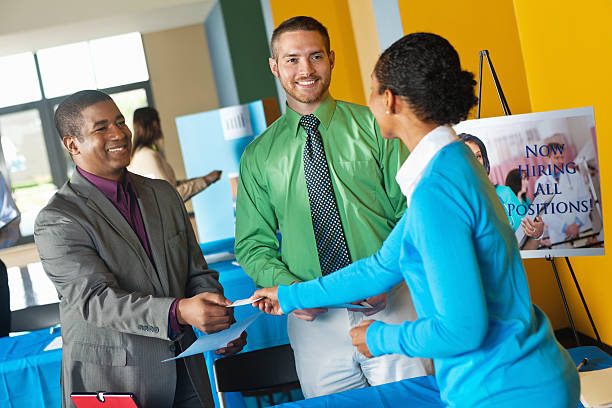Attending job fairs is a productive way to find potential employers, connect with other experts in your field, and set up in-person interviews for available openings at participating companies.
It is essential to bring a few items to a job fair to improve your chances of catching the attention of prospective employers and leaving a lasting impression.
Everything you need to know will be covered in this post, including how to prepare for the event, what to bring, and some best tips on how to master a job fair.
Follow these nine actions, and you’ll be on your way to landing interviews in no time.
What is a Job Fair?
An event that brings together a variety of businesses and organizations actively seeking new personnel is known as a job fair or career fair.
Professionals can network with one another, meet and connect with potential employers, and interview for available openings at a career fair.
Similarly, recruiting managers and staff recruiters will have a booth to discuss opportunities within their company and give job searchers literature and other company information.
What to Bring When Coming to a Job Fair
When taking part in a job fair, there are several items that you may consider bringing with you to help you present yourself to recruiters and hiring managers.
1. Extra Copies of Your CV
One of the most crucial things you should bring to the job fair is your CV! This might serve as an overview of your qualifications, employment history, and educational background for a general resume.
You can highlight your entire experience and skill set with a generic resume. If your desired position is currently occupied, send a more generalist resume to a company of interest.
This way, you can show the employer how interested you are and provide your contact information in case your dream job becomes available.
2. Targeted Resumes
Please bring copies of your targeted resumes to improve your chances of being seen by the organization you are interested in applying, even though it is still vital to bring extra copies of your resume.
Targeted resumes will only highlight your professional background, educational background, and expertise relevant to a particular position.
Consider keeping a few of these focused resumes on hand so you may give a copy to a recruiter when you meet for the job you desire.
3. Business Cards

Consider bringing dedicated business cards to the job fair if you have one.
You can also include a job title, a brief mission statement, or another qualifying description on your business card and your full name, phone number, email address, and other contact details.
In addition, you can give your business card to companies that interest you and those that don’t have any available opportunities that match your qualifications as you navigate the career fair.
You can describe the position you’re searching for and request to be contacted should an opportunity arise. The prospective employer will have your contact details if a position becomes available.
4. Professional Portfolio
Consider bringing your professional portfolio if you have one. A portfolio can help you demonstrate your success in previous employment to hiring managers and recruiters, which is especially helpful if you work in a field where you produce various visual goods.
Your portfolio can also demonstrate your hard and soft skills for finishing tasks. Only professional materials relevant to your desired positions should be included in your portfolio.
5. Notepad/Paper and Pens
Bring a notepad, a small notebook, and extra pens to your job fair. When attending interviews within the career fair, consider taking quick notes after each session to help you remember who you spoke with.
Also, remember what company they worked for and important details like the job requirements, salary range, and contact details of the hiring managers you met or can get in touch with.
6. Extra Change of Clothes
You might not have to worry about packing extra business wear if you live close to the career fair you visit. But if you have a long commute to the event, you should bring one extra change of business attire.
It might come in handy in the event of a rip or problematic zipper or if coffee gets on your crisp, white shirt.
If you prepare your clothes in advance, you can take preventative measures if your formal wear is soiled.
7. Application Preparation Materials
You may have researched potential jobs you are interested in interviewing for, but you should also prepare for jobs you wish to apply for.
Do you need any further information to apply for a job? For example, maintain a record of references, including names, phone numbers, and other contact details for previous employers.
Similarly, if you fill out applications at the career fair, you can use the references listed on your CV.
8. Your Elevator Speech
A concise and straightforward approach to describing yourself, your career goal, and how you can meet the job requirements is through an elevator speech, also known as an elevator pitch.
By practicing your pitch beforehand, you may be completely prepared for what you say when you speak with potential employers, as career fairs are typically large events attended by numerous firms, recruiters, and potential employers.
To ensure your pitch is delivered in less than sixty seconds, practice your introduction and how you will leave a lasting impression.

9. A List of Questions to Ask Recruiters
Making a strong first impression on hiring managers and obtaining the information you need to choose which firms to apply to requires knowing what questions to ask during a job fair interview.
Prejudging someone’s professionalism in a five-minute job fair interview in a hectic setting needs more time. Nevertheless, recruiters at these events are adept at assessing applicants quickly.
Job seekers with intelligent, appropriate questions show they are detail-oriented and have strong research abilities.
They also seem more prepared than other attendees, whose questions are simple enough to find the answers to on Google.
Best Tips for Preparing and Acing a Job Fair
Plan Your Day
Attending a job fair might be daunting. You want to maintain your energy before visiting your top picks if you have a lengthy list of organizations to visit.
The secret to success is to organize your day in advance. To ensure recruiters see your best side, make a rough timetable and organize early-morning visits to firms you are truly interested in.
Your second and third options should be saved for later.
Keep an Open Mind
Remember to keep the doors open, even if you’ve done extensive research on participating firms and have a well-defined plan of action for the fair.
You never know; after speaking with personnel on the spot, a company that didn’t initially spark your interest can be the ideal fit. You can avoid losing out on prospective professional chances by maintaining an open mind.
Wrapping Up
While making an impression at a career fair is not always simple, you’ll already be ahead if you show up prepared and well-groomed, approach the tables with grace and practice, and follow up appropriately.
Frequently Asked Questions
How do job fairs work?
At a job fair, candidates can network with various employers from various industries, which expedites the application process. Attendees can discover more about possible job prospects by asking questions, submitting resumes, and making introductions.
It is also an opportunity for in-person networking and a convenient approach to quickly look into various job options in one location.
Universities, professional associations, or community organizations usually organize these hiring events.
What happens at a job fair?
At a job fair, you’ll visit booths of various employers to receive more information about their business, connect with recruiters, gather information about job openings, and even participate in on-the-spot interviews.
How many resumes should I bring to a job fair?
You should bring as many resumes as the number of companies you plan on visiting, plus a few additional copies for backup.
About five extra copies should be enough if you lose one or two or visit more company booths than you originally planned.
How do you stand out at a job fair?
Standing out among hundreds of other attendees can be difficult, so make sure you:
- Dress professionally
- Network actively
- Prepare well-researched, thoughtful questions
- Follow up with recruiters after the career fair
Do I need a cover letter for a job fair?
While you don’t need to bring a cover letter to a job fair, writing a general cover letter to accompany your resume is a good idea.
Not only does it show potential employers that you’re ready to go the extra mile, but it’s also an opportunity to showcase more of your abilities.